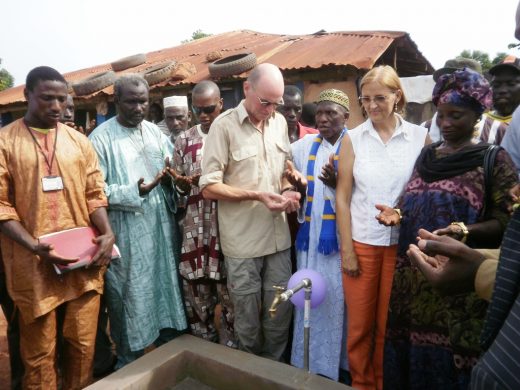
(Giving thanks for new water system – supported by Dawda Foundation Gambia)
The Dawda Foundation Gambia is a Community-Based non-governmental organization established in 2010 as a Charitable Foundation registered in Holland. The founders, Eric and Mariette Corstjens, through the Village Development Committee (VDC ) started cooperation with the people of Somita in 2007 and this committee is still its primary contact. This is the most important central committee in the village, and takes care of governmental issues.
The Somita project is the main initiative of the foundation in The Gambia and has a focus on smallholder agriculture and food security, sustainable land management and water security.
100% of the investment funds contributed by sponsors are utilized to create the conditions that transform the power of the people of Somita into self-reliance.
The origin and goal of the organization is to improve the life circumstances of women and children in Somita and to improve the self-reliance of the people.
The Dawda Foundation Gambia is a Community-Based non-governmental organization established in 2010 as a Charitable Foundation registered in Holland. The founders, Eric and Mariette Corstjens, through the Village Development Committee (VDC ) started cooperation with the people of Somita in 2007 and this committee is still its primary contact. This is the most important central committee in the village, and takes care of governmental issues.
The Somita project is the main initiative of the foundation in The Gambia and has a focus on smallholder agriculture and food security, sustainable land management and water security.
100% of the investment funds contributed by sponsors are utilized to create the conditions that transform the power of the people of Somita into self-reliance.
The origin and goal of the organization is to improve the life circumstances of women and children in Somita and to improve the self-reliance of the people.

This has been achieved so far by improving medical care, renovating the clinic, arranging a medical staff, renovating a number of schools, supporting the educational staff, providing access to clean drinking water by installing a complete water supply system and installing several machines for food processing, such as a couscous milling machine and a rice machine.
These basic needs have been successfully implemented and the community has proven to be able to maintain them. A monthly contribution is paid for the water supply system, which enables maintenance and reparations of the system. The water committee manages the water supply system, collects the contributions, makes sure the tap points are well-maintained and keeps the surroundings of the tap points clean. They also take action if the agreements regarding the tap points, clean surroundings and waste are not met.
The food processing machines alleviate the heavy work for the women and the proceeds of these machines are put into a fund for replacement and reparations. Before, there were a limited number of hand pumps; today there is a water tap for every 125 inhabitants.
The next step for development of self-reliance was the creation of a micro-credit bank, which has provided over 400 loans in the three years of its existence. All loans have been paid back. A large number of businesses have been founded with these loans. The interest paid to the micro credit bank is deposited into an educational fund, which pays the tuition for children whose parents are unable to afford tuition. Currently, tuition is paid for approximately 125 children.
The bank is managed by local residents of Somita that have been educated by the sponsors. The bank’s original capital, which was donated, has been transferred to the people of Somita. This lending within the community by this local “bank” enforces the internal cohesion of the population.
A large garden has been developed in combination with a large central market hall, 18 shops and 60 marketplaces, which was constructed in 2014 the food can now be sold safely and stored if necessary. Most of the shops have been financed by the micro-credit bank. The village now has a commercial center.
One critical starting point is that gender and age equality must apply to all project support. It is striking that women take charge in many of the projects. Most micro credits are given to women, who eventually succeed in starting a business with the borrowed money, sometimes even hiring employees.
All projects are executed according to the three-step plan: Empowerment, Capacity Building and Ownership. These are essential conditions for sustainability; ECO for short. All projects are created by the community (men and women, young and old) and all projects are owned by the community as well.
The purpose of this overall initiative in Somita is to tap into the inner strength of the population in order to create and develop self-reliance.
While the Foundation helps to facilitate the projects that come from the community, as soon as the construction is started they are owned by the community. The Foundation does not do the developmental work; it facilitates the community in executing their own well thought out plans. By improving self-reliance they become the owner and manager and the Foundation steps back.
Written by Eric Corstjens
Contact person:
Mr. Eric Corstjens, Chairman Dawda Foundation Gambia (Dutch name: Dawda Stichting Gambia) Langeweg 34, 6591 XX Gennep, The Netherlands
+31 6 51478180 / +31 485 540740 / e_corstjens@hotmail.com / www.dawdasg.nl
Bank Account: NL53ABNA0561525234